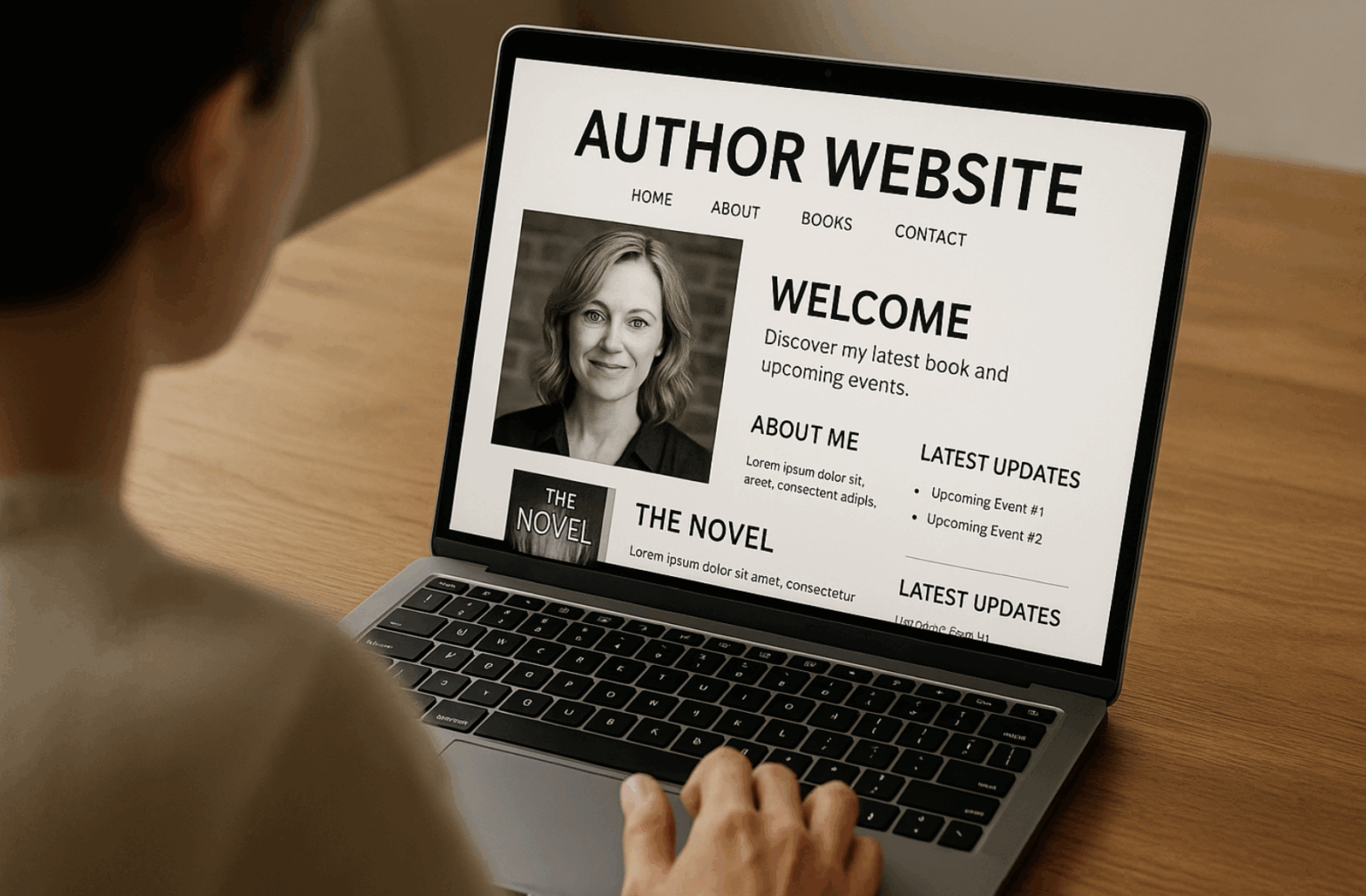Let’s face it, as an author, you’ve got a lot on your plate: writing and editing your book, learning how to market your book, and, of course, dealing with those strange emails that somehow always end up in your spam folder. But there’s one thing you absolutely must get right: your author website. It’s your digital home, your 24/7 bookshop, and your chance to make a first impression that’ll have readers clicking ‘Buy Now’ before you can say “author branding.”
In this blog, we’ve rounded up 15 of the best author websites—sites so inspiring, you’ll be itching to revamp your own. Whether you’re a self-published author or a best-selling pro, these websites offer a perfect blend of design, functionality, and personality. So, grab your favorite coffee and get ready to take notes—your author website just got a makeover!
Why Author Websites Matter (And Why You Needs One)
Let’s talk about the elephant in the room: You might be thinking, “Do I really need a website? I’ve got social media!” And sure, social media is great for shouting into the void and hoping someone hears you (we’ve all been there), but here’s the deal—your author website is the only place on the internet where you have full control. No algorithms, no character limits, just you, your work, and your brand, all in one beautiful, clickable space.
A great author website does more than just look pretty (though that’s important, too!). It’s a place where potential readers can get to know you, discover your books, sign up for your newsletter (because yes, email marketing is still a thing), and even get to see your quirky side through blogs or behind-the-scenes content. Plus, it helps you look legit, like, “I’m a real author, not just someone who writes in their spare time between episodes of Netflix.”
So, if you’re still holding out on creating your author website, let this be your official nudge. A well-designed website is your personal storefront in the vast world of the internet, and guess what? Readers are already shopping for it. The question is, will they find yours? Let’s dive into the websites that are setting the standard—and maybe inspire you to start building yours today!
Your Publishing Journey Awaits – Start Now15 Inspiring Author Websites to Explore
Now that we’ve got you pumped about the importance of an author website, let’s dive into the good stuff: the websites that will make you say, “I wish I’d thought of that!” From sleek designs to creative layouts, here are 15 author websites that hit it out of the park. Grab your notepad (or your phone) because you’ll want to take notes on these!
J.K. Rowling – jkrowling.com
As the queen of modern fantasy, J.K. Rowling’s website is nothing short of magical. It’s clean, simple, and elegant—just like the wizarding world she’s created. The site focuses on her books, with easy navigation to explore each series, but it also gives her a platform to discuss charity work and recent news. Plus, there’s an entire section dedicated to Harry Potter fans with interactive features. The website feels just as immersive as her stories.
Key Takeaway: A clean, immersive design that blends books with personal causes, offering fans interactive features that enhance engagement.
Stephen King – stephenking.com
Stephen King’s website mirrors his storytelling, straightforward and powerful. The homepage greets visitors with bold colors, an interactive design, and quick links to his books, upcoming events, and news. What stands out is his “News” section, which keeps fans updated on everything from book launches to movie adaptations. It’s a no-nonsense, engaging experience for fans who want to know what’s coming next.
Key Takeaway: A bold, no-nonsense layout that keeps fans up to date with books, events, and news, reflecting his straightforward storytelling style.
– Screenshot from Adichie’s home page.
Chimamanda Ngozi Adichie – chimamanda.com
Adichie’s website feels like stepping into her world—classy and literary. The site’s design is minimalistic yet striking, with gorgeous images and simple navigation. Her books take center stage, but what’s really unique is her personal connection to her audience through features like interviews and essays. The site is a wonderful extension of her brand as an insightful, thought-provoking author.
Key Takeaway: A minimalistic, classy design with a personal touch, connecting readers to her through interviews and essays.
Neil Gaiman – neilgaiman.com
Neil Gaiman’s website is a treasure trove for fans of all things dark and fantastical. His site is divided into sections that focus on his books, writing advice, and even a blog where he shares his thoughts on the world. The design is quirky and playful, much like Gaiman himself. Plus, the “I Have a Story” section is an interactive experience that invites visitors to contribute to his ever-growing world of fiction.
Key Takeaway: A quirky, interactive site that invites fans into Gaiman’s fantastical world, with sections for books, writing advice, and creative contributions.
Amanda Hocking – amandahocking.com
As a self-published author who went on to achieve international success, Amanda Hocking’s website is a shining example of how self-published authors can thrive with a sleek, professional online presence. The website is user-friendly, with a clean design and clear calls to action for buying her books. It also features a blog where Amanda shares her self-publishing journey, providing inspiration to other aspiring authors.
Key Takeaway: A sleek, professional website for a self-published author, offering an easy-to-navigate design with clear calls to action and a blog to inspire aspiring writers.
George R.R. Martin – georgerrmartin.com
Known for creating the Game of Thrones saga, George R.R. Martin’s website is rich with content. Fans can dive into detailed information about his books, check out his blog, and even read about his writing process. The design matches the epic, medieval tone of his stories, making it the perfect digital home for such a complex universe. Plus, it features a “News” section that keeps everyone in the loop about the latest Game of Thrones developments.
Key Takeaway: An immersive site that matches the epic tone of his books, providing rich content and a dedicated section for Game of Thrones updates.
– Screenshot from Kaur’s home page.
Rupi Kaur – rupikaur.com
Rupi Kaur’s website is an excellent example of how authors can embrace minimalism while still conveying their personal style. The website has a beautiful, clean design that showcases her poetry, books, and visual art. There’s a focus on her Instagram presence, which works perfectly with her brand as a poet and visual artist. The site feels intimate, like stepping into Kaur’s world of words and images.
Key Takeaway: A minimalist yet intimate design that showcases her poetry and visual art, blending her brand seamlessly with her social media presence.
Colleen Hoover – colleenhoover.com
Colleen Hoover’s website is vibrant and welcoming, much like her writing. The site prominently features her books with eye-catching images and a layout that’s easy to navigate. What makes this site truly stand out is the “Fans” section, where readers can sign up for exclusive updates and interact with Colleen’s content. There’s a real sense of community here, inviting fans to feel part of the story.
Key Takeaway: A vibrant, welcoming site that emphasizes fan interaction, with a strong sense of community through exclusive updates and content.
Liane Moriarty – lianemoriarty.com
Liane Moriarty’s website reflects her style—approachable, warm, and engaging. Her site showcases her novels with a clean, streamlined design and includes interactive elements like a newsletter signup and a blog. It’s easy for readers to find what they’re looking for, whether it’s book info or upcoming events, and her personality really shines through in her content.
Key Takeaway: An approachable design that balances book promotion with personal engagement, featuring interactive elements like a blog and newsletter sign-up.
Joanna Penn – thecreativepenn.com
Joanna Penn’s website is a stellar example of how a self-published author can create an authoritative, engaging online presence. Her site offers a perfect balance of professional and personal, with resources for writers, insights on self-publishing, and tips on marketing. It’s also optimized for easy navigation, making it a great example for anyone looking to self-publish and build an author brand from the ground up.
Key Takeaway: A professional, informative site that balances self-publishing resources with personal insights, providing a valuable hub for aspiring authors.
Tomi Adeyemi – tomiadeyemi.com
Tomi Adeyemi’s website is a striking, bold reflection of her YA fantasy novels. The design is immersive, with rich imagery from her book Children of Blood and Bone that immediately transports visitors into her world. The website includes easy access to her books, upcoming events, and links to her social media, making it an excellent hub for fan engagement.
Key Takeaway: A bold, visually stunning site that mirrors her YA fantasy books, with strong fan engagement and easy access to her work and events.
– Screenshot from Green’s home page.
John Green – johngreenbooks.com
John Green’s website feels like a cozy, interactive corner of the internet where fans can find not only his books but also his podcast and educational videos. The website’s clean layout and easy navigation make it simple for readers to explore, while the inclusion of Green’s personal projects and outreach keeps the experience personal and meaningful.
Key Takeaway: A cozy, interactive site that features not only his books but also personal projects and outreach, fostering a deep connection with fans.
Sally Rooney – sallyrooney.com
Sally Rooney’s website embraces a minimalist design, with soft colors and simple fonts that reflect her writing style. The focus is on her books, which are presented in a straightforward way, but there’s also a blog and sections dedicated to events and interviews. The design feels polished and intellectual, matching the tone of her books.
Key Takeaway: A minimalist, polished design that reflects her intellectual style, with a focus on her books, events, and interviews.
Brandon Sanderson – brandonsanderson.com
As a prolific author of epic fantasy, Brandon Sanderson’s website offers a deep dive into his vast universe of books. The layout is clean, and each of his series is well-organized, with plenty of resources for readers to explore. His site also includes a section where fans can follow the progress of his upcoming projects—perfect for the voracious reader who wants to keep up with every twist and turn.
Key Takeaway: A well-organized site that allows fans to dive deep into his expansive universe, with regular updates on ongoing projects and books.
Sarah J. Maas – sarahjmaas.com
Sarah J. Maas’s website reflects the immersive fantasy worlds she’s created in her Throne of Glass and A Court of Thorns and Roses series. The design is visually stunning, with a focus on book covers, character details, and fan engagement. There are plenty of interactive elements like an FAQ section and a newsletter sign-up, allowing fans to feel closely connected to Maas and her work.
Key Takeaway: A visually captivating site that immerses fans in her fantasy worlds, with interactive features like an FAQ section and newsletter sign-up to deepen fan engagement.
Tips for Creating Your Own Author Website (Yes, You Can Do It!)
Now that you’ve seen what the pros are doing, you’re probably feeling both inspired and a little overwhelmed (it’s okay, we’ve all been there!). But fear not—building your own author website doesn’t have to be a Herculean task. In fact, it can be a fun, creative process that helps you connect with your readers and show off your unique author brand.
So, let’s break it down. Here are some simple, actionable tips to help you build a website that’ll have your readers clicking “bookmark” faster than you can write your next novel.
- Keep It Simple (But Stunning). The best author websites are clean and easy to navigate. Think of your website as a bookshelf—people don’t want to sift through a messy pile of books to find their favorite one. Use a simple, user-friendly layout that makes it easy for visitors to explore your books, sign up for your newsletter, or contact you. Keep the design focused on your content—no one needs a pop-up every time they scroll.
- Make Your Books the Star. Your books are your business card, your calling card, your everything. So, make sure they’re front and center. Include high-quality images of your eye-catching book covers, detailed synopses, and links to where readers can buy or download your work. Whether you’re self-published or traditionally published, you want your books to shine like diamonds in a display case.
- Get Personal (But Not Too Personal). Readers want to connect with you—the person behind the pen. Include a brief, engaging author bio that highlights your journey, your writing style, and what drives you. You don’t need to list every detail of your life (save that for your memoir), but a bit of personality goes a long way. And don’t forget to add a photo! A smiling, approachable picture helps readers feel like they’re getting to know you.
- Blog It Up. A blog is a fantastic way to engage with your audience and boost your SEO on your author website (hello, Google!). It’s the perfect place to share writing updates, thoughts on your latest book, and even sneak peeks of upcoming projects. You don’t need to blog every day (unless you’re super ambitious), but a few posts each month will keep readers coming back for more.
- Mobile-Friendly Design is a Must. These days, your readers are probably browsing on their phones, so make sure your website looks just as good on a smartphone as it does on a desktop. A responsive design (meaning the site adapts to the device it’s being viewed on) is key. If it’s hard to read or navigate on a phone, you can bet your readers will click away faster than you can say “SEO optimization.”
- Clear Calls-to-Action (CTAs). Every page of your website should have a clear CTA. What do you want your readers to do when they visit your site? Buy a book? Sign up for your newsletter? Follow you on social media? Make it obvious. Use buttons like “Get My Book Now” or “Join My Newsletter” that stand out and are easy to click.
- Link to Your Social Media. Your website should be the hub of your online presence, but don’t forget to include links to your social media profiles. Whether you’re on Instagram, Twitter, Facebook, or TikTok, make it easy for readers to follow you and engage with you on other platforms. Social media is an excellent way to build a community, and your website is the perfect place to send people to join the fun.
Bonus Tip: Make It Yours
Lastly, don’t be afraid to get creative! Your website is an extension of your personal brand, so let it reflect your style, your personality, and the world of your writing. Whether you love bold colors, quirky fonts, or minimalist designs, make sure your site feels like you. After all, this is your digital space to shine—and there’s no one else quite like you!
Wrapping It Up: Time to Build Your Author Website!
By now, you’ve seen some of the most inspiring author websites out there and learned how they’ve nailed the essentials—like easy navigation, captivating book showcases, and personal touches that make readers feel like they’re getting to know the author behind the words. The good news is, you don’t need to be a tech genius or a web designer to create a stunning website for yourself. With the right tools and a little creativity, you can craft a site that truly represents you and your work.
Whether you’re self-published or traditionally published, your website is your digital home—your online hub where readers can explore your books, connect with you, and stay updated on your latest projects. Remember, your website is one of the first places potential readers will discover you, so it’s crucial to make that first impression count.
Your Next Steps
- Choose a Platform: Platforms like WordPress, Squarespace, and Wix make it easy to design your website without needing to code. Choose one that fits your style and budget.
- Pick a Template: Don’t reinvent the wheel—use a pre-designed template and customize it to suit your author brand. There are plenty of beautiful, ready-to-go templates made specifically for authors.
- Start Creating Content: Add your bio, books, blog posts, and any other content that gives readers a glimpse into your writing world. Don’t forget to add those CTAs so readers can buy your books, sign up for your newsletter, or follow you on social media.
- Make It Live: Once your site is up and running, test it out! Make sure all the links work, check that it looks great on mobile, and ensure the load time is fast. Then, hit that “Publish” button and let the world see your work!
Get Inspired, Then Take Action
While it’s fantastic to draw inspiration from other authors’ websites, remember that your website should reflect your unique voice and vision. Don’t be afraid to experiment with design and functionality until it feels just right. After all, your website is your space to showcase what you’ve created, so make sure it speaks to who you are as an author and what your books are all about.
Now, go ahead and create the author website of your dreams—it’s time to turn your digital space into a destination for readers and fans. And don’t forget: Your story doesn’t stop when the book is published. Your website is a powerful tool to keep the conversation going, engage with your readers, and build a long-lasting relationship with your audience.
FAQs – Author Websites
Q: Do I really need a website as an author?
Yes! An author website is your online home, where you can showcase your books, connect with readers, and establish your personal brand. It’s a key tool for marketing your books and keeping your audience engaged. Plus, it provides a professional presence that social media alone can’t replicate.
Q: How much should I spend on my author website?
The cost of building an author website can vary greatly depending on your needs and budget. There are affordable website builders like WordPress, Wix, and Squarespace, which offer free or low-cost plans. If you prefer a custom design, hiring a web designer may cost more, but it can provide a more unique and polished result. The key is to start simple and scale as you grow.
Q: How can I make my author website stand out from others?
To make your website unique, focus on your personal style and branding. Use design elements that reflect your genre and personality, whether it’s minimalistic, bold, or whimsical. Include interactive features like quizzes, fan polls, or book excerpts, and let your personality shine through your bio, blog posts, and newsletter content.
Q: Do I need to hire a web designer to create my author website?
Not necessarily! Many authors use website builders like WordPress, Squarespace, or Wix to create their own sites without any coding knowledge. These platforms offer templates specifically designed for authors, so you can get your site up and running with minimal effort. However, if you want a completely custom design or don’t have the time, hiring a web designer could be a great option.
Q: How often should I update my author website?
It’s important to update your website regularly, especially when you release a new book, write a blog post, or have upcoming events. Aim to refresh your content at least once a month, but any time you have something new to share with your readers is a great time to update.
Q: Should I include an online store on my author website?
If you’re self-published, having an online store where readers can buy your books directly from your site can be a great way to maximize profits. However, if you’re traditionally published, most authors link to external retailers (like Amazon) for book sales instead. Make sure your website has clear, accessible links for readers to purchase your books wherever they prefer.
Q: How do I improve my author website’s visibility on search engines?
To improve your website’s search engine visibility, focus on basic SEO (Search Engine optimization) practices. Use relevant keywords like “author websites” and “best author websites” throughout your content. Include alt text for images, optimize your page titles and meta descriptions, and ensure your website loads quickly and is mobile-friendly. Regularly adding blog posts or updates will also help boost your search engine ranking.







